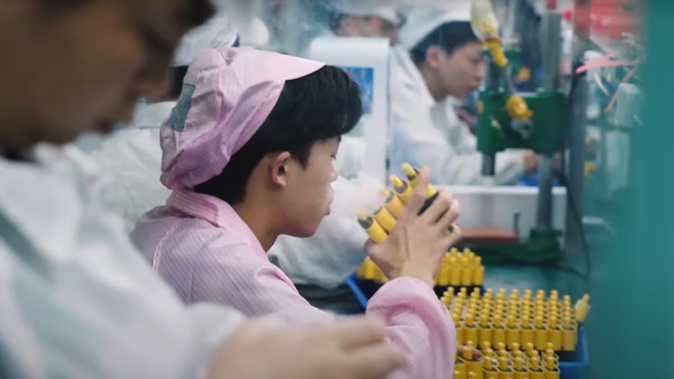
A documentary maker visiting a Chinese vape factory has recorded the remarkable way the devices are tested - and vape users have been left stunned.
YouTube channel Machina visited a factory in Shenzhen that produces a dizzying array of products, relying largely on human labour to get the job done.
The journalist shows various steps of the production process as the camera pans along lines of workers putting the vapes together.
When the vapes are finished they must be tested and machines are used to ensure that they are correctly pressured and produce vapour when suction is applied, with a machine taking the place of human lungs to suck the nicotine-laced contents out.
But then, the highlight of the video appears.

A journalist was surprised to discover at the amount a Chinese factory worker had to inhale a day.
The man constantly vapes throughout his shift, telling an interviewer he hits approximately 8000 to 10,000 vapes a day.
The video shows him sucking on each vape in quick succession, appearing not to take much of the vapour down but not pausing between puffs.
He tells an interviewer that his nicotine consumption isn’t solely tied to his work, admitting to enjoying a cheeky puff after work too.
Later in the video, it’s explained that human testing is necessary to ensure the taste remains consistent - and that each device is sterilised before it is sent off.
Users reacted with shock to the man’s job, with one saying: “Are you telling me this guy is my first ever kiss?”.
Another said the young man was “speed running life” while some expressed concern that the job would be having a negative impact on his health.
Vaping in New Zealand
Stricter rules for the sale of vapes came into force in December in New Zealand. A compliance check found many stores were still flouting the law.
Earlier this year, the Herald reported banned vaping devices are still being openly sold despite a crackdown, say researchers who investigated retailers using a “mystery shopper”.
Many of the stores also failed to verify age and were selling vapes at heavily discounted prices, with some admitting they were going cheap because they were illegal.
The findings showed that regulation changes that were designed to make vaping less affordable and less attractive to young people had been largely ineffective, researchers said.
“We were surprised by some of the blatant breaches of the rules,” said Dr Jude Ball, a public health researcher at the University of Otago who specialises in adolescent health and substance use.
“Retailers were saying ‘these ones over here are half-price because they’re not legal anymore’ and other instances where they clearly knew they were breaking the law.”
Take your Radio, Podcasts and Music with you









